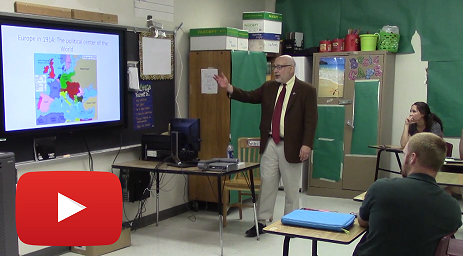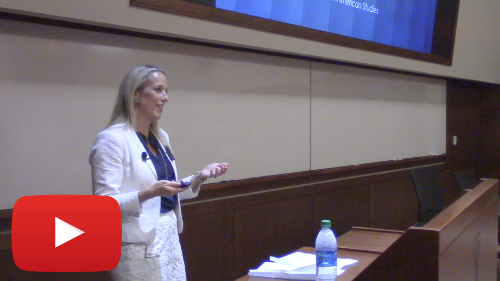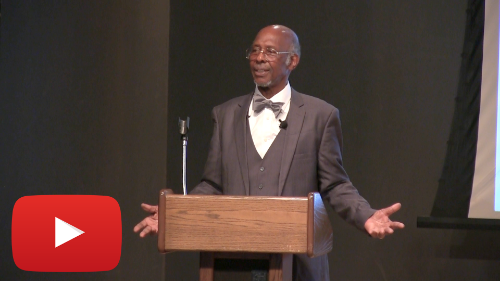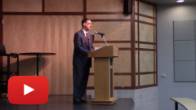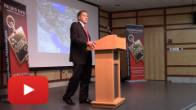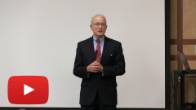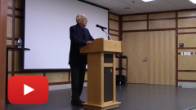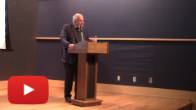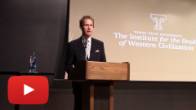Recent Events
Summer 2019 Lecture Series
“The Constitution and Religion as a Public Good”
Featuring Dr. Susan Hanssen, Professor of History at the University of Dallas. (Delivered in the Senate Room of the Texas Tech Student Union, on October 18th, 2019.)
Most discussions about the role of religion in the American Founding focus on the constitutional guarantees for religious freedom and the prohibition of an established church. Dr. Hanssen argues that this leaves out something equally important, the belief held by almost everyone at the time that a republic had to be virtuous in order to survive, and that virtue depended on religion. George Washington's notion of religion as a public good is examined as an illustration of this widespread conviction.
Steve Balch interviews Dr. Susan Hanssen of the University of Dallas about her experience teaching the Western and American traditions, as well as her research on Henry Adams.
Spring 2019 Lecture Series
"Fame, Fortune, and Philosophy: The Enduring Legacy of Boethius"
Featuring Dr. Kenneth Hawley
Boethius provides an unusual bridge between the classical and Christian worlds, and many translators of his de Consolatione Philosophiae have found themselves in a challenging position—writing faithfully as true believers (in God, in Boethius, and in his Consolation) but at the same time defending anxiously a work that is not explicitly Christian. Viewing the Consolation as a work of both philosophy and theology, they have been eager to affirm its author's orthodoxy and strengthen those struggling to believe in the God of Boethius's universe. Other translators have shared the Consolation of Philosophy after having personally suffered a tragic loss just as Boethius did. To appreciate the remarkable persistence of Boethian influence through centuries of political revolution and religious controversy, we must examine these anxieties and how those inspired by Boethius resolved them.
"The Greek Pursuit of Practical Reason"
Featuring Josiah Ober, Professor of Classics and Political Science at the University of Stanford
Ancient Greek political and ethical thought, from Homer through Plutarch and beyond, was concerned, not only with justice, virtue, and the human good, but also with instrumental rationality and its limits. The sophistication of historically distinctive Greek thinking on the process of choosing the most efficient means to obtain desired outcomes has been obscured, first, by the emphasis of Greek ethics (notably Plato and Aristotle) on the rationality of ends, and also, by the association of instrumentalism with sophism, and finally, by the belief that the Greeks lacked the relevant concepts of probability and risk. I argue that Greek thinking about practical reason is rightly understood as a discovery and that it shares certain key intuitions about human preferences, beliefs, and expectations with modern theories of choice.
"Western Music in Global Context"
Featuring Dr. Mark Hijleh
The emergence of a distinctive Western European music between c.1200 and 1350 changed the course of human musical and cultural history. However, both the emergence and long-term impact of that musical culture was and is more complex than has sometimes been put forward in the cultural education of Western musicians and musical aficionados. Western music, like all music, is best seen in a global historical context framed around inter/transcultural convergence, fusion, and transformation. Thus, again like all music across human history, Western music and its impact have continued to evolve as the speed of global change has accelerated. Using research from his newest book Towards a Global Music History, Dr. Mark Hijleh, Provost and Professor of Music at The King's College (New York City) discusses these phenomena and some of their implications for both the present and the future.
"The Silk Route"
Featuring Jeremy Mclnerney
By the second century AD the sporadic episodes of population movement and cultural contact across the central Eurasian Steppes had given way to the development of a complex trade network: the Silk Route. The working hypothesis of this paper is that this transformation was accomplished by Alexander the Great. While in the Upper Satrapies, Alexander learned of a vast territorial empire beyond the Pamir Mountains. The cost of territorial expansion into western China, however, was prohibitively expensive, and unnecessary, provided he could secure the wealth of the silk route trade by the control of nodes along the network. If this is correct then it makes necessary a reevaluation of ancient concepts of imperial hegemony: Hellenistic empires, like the Seleucids', were based not on the acquisition of land, but on resource extraction and controlling the flow of goods through strategic corridors of territory.
Watch trailers for the Institute's Spring 2018 Lectures and Lecture Series:
Watch all Spring 2018 Lectures by visiting our Lecture Archives.
June 27, 2018
Featuring Dr. Stephen H. Balch, Director of The Institute for the Study of Western Civilization at Texas Tech University
Dr. Steve Balch of the Texas Tech Institute for the Study of Western Civilization
delivered a talk on "The Great War and How it Changed the World" at Iron's Middle
School in Lubbock, Texas on June 27, 2018. This lecture was part of the annual "Lights,
Camera, Extravaganza" teaching conference hosted by the Lubbock Independent School
District. This video is a composite of the two lectures delivered on the same day.
September 06, 2018
Featuring Dr. Anne Rathbone Bradley, Academic Director and the George and Sally Mayer Fellow for Economic Education of The Fund for American Studies
Dr. Anne Rathbone Bradley is the academic director and the George and Sally Mayer Fellow for Economic Education of The Fund for American Studies. She received her Ph.D. in economics from George Mason University in 2006. Previously, Dr. Bradley served as the vice president of economic initiatives at the Institute for Faith, Work & Economics and is currently a visiting professor of economics at Georgetown University and George Mason University. Her academic research focuses on income inequality, economic freedom, and the political economy of terrorism, with an emphasis on the industrial organization of al-Qaeda. Dr. Bradley has also worked as an economic analyst for the Central Intelligence Agency's Office of Terrorism Analysis.
This event was sponsored by The Free Market Institute and The Institute for the Study of Western Civilization at Texas Tech University.
CONSTITUTION WEEK: A Lecture Series Event
September 13, 2018
Featuring William B. Allen, Emeritus Dean and Professor, Michigan State University
and current Visiting Professor of Conservative Thought and Policy, University of Colorado
In the beginning, Americans got it right. They did not fall for the false choice between
the comfort of the least and the potential of the best, sometimes posed as a choice
between the common good and individualism. Instead, the founders envisioned a productive
people who were at the same time a caring people. They identified social progress
with realizing the potential of the best. Lately social progress tends to be identified
with the comfort of the least. As a result, many have turned away from relying upon
creative and productive individuals to advance society and first of all look at citizens
as wards of the state (the disadvantaged) and secondly as lucky (the advantaged; “you
didn't build that”). The problem is, a society can care for the least of its members
only when it fosters the productivity of the best of its citizens. An upside down
view of praiseworthy character threatens to undermine the foundation of social progress
in good character. Good character in turn builds upon conscientious self-reliance.
This event was the featured lecture of the Institute's highly anticipated "Constitution
Week."
"Constitution Week" TTU Faculty Lectures:
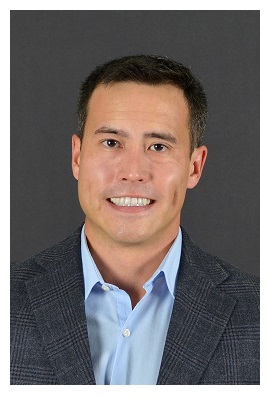
Ryan Hackenbracht
Assistant Professor, Department of English, TTU
"Holy Disobedience, Compulsory Liberty: Hobbes, Locke, and the Biblical Right to Be
Bad"
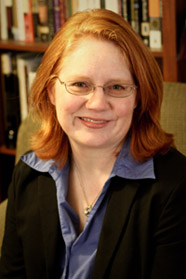
Stacey Jocoy
Associate Professor, School of Music, TTU
"From Yankee Doodle Dandy to Hamilton: Music that Makes the Nation"
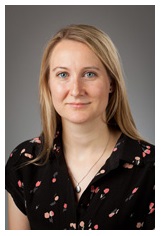
Erin-Marie Legacey
Assistant Professor, Department of History, TTU
"The Dead and the Founding of the French Revolution"
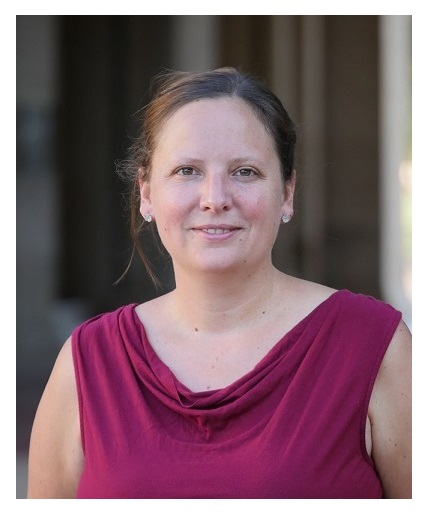
Sydnor Roy
Assistant Professor of Classics, Department of Classical and Modern Languages and
Literatures, TTU
"Lawgivers or Tyrants: Plutarch's Lives and the contested status of the 'Founding
Fathers' in Revolutionary -era America"
September 19, 2018
Featuring Bruce Brasington, Professor of History at West Texas A&M University
A century ago, Henry Adams declared that the Middle Ages, symbolized by the soaring arches and beautiful sculptures of Chartres cathedral, had been surpassed by modern science and industry: For seven hundred years Chartres has seen pilgrims, coming and going more or less like us, and will perhaps see them for another seven hundred years; but we shall see it no more, and can safely leave the Virgin in her majesty, with her three great prophets on either hand, as calm and confident in their own strength and in God's providence as they were when Saint Louis was born, but looking down from a deserted heaven, into an empty church, on a death faith. Today, his judgment seems even more apt, the Middle Ages even more remote and seemingly irrelevant, or our world of smartphones and tablets. I disagree. For all its shortcomings, hypocrisies, even horrors, the Middle Ages deserves more from us than exploitation as fantastic entertainment or contempt as a "Dark Age." We shall discover that, across the centuries, medieval people speak to us about the permanent things, the things that matter: faith, hope, and love. And the last most of all.
October 4, 2018
The Phi Beta Kappa Society Visiting Scholar Program
FeaturingJamsheed Choksy, Professor and Chairperson of the Department of Central Eurasian Studies at Indiana
University, Bloomington
Shahs, ayatollahs, and protestors come to mind as stereotypical images of Iran in
the twentieth and twenty-first centuries. Yet contemporary Iran has been shaped not
just by kings, clergy, and uprisings. This topic discusses how the country's geography,
natural resources, international relations, and domestic changes combined with foreign
influences and interventions to produce a political system in which the executive,
legislative, and judicial branches of government—not dissimilar to those of the US—become
subordinate to a theocratic establishment.
Dr. Jamsheed Choksy's writings and lectures explore why human existence is viewed
as a struggle between good and evil, and how beliefs and practices shape people's
lives and actions. He is a leading authority on the Arab conquest of Iran, Iraq, the
Persian Gulf, and Central Asia, the spread of Islam, and the impact of faith on politics,
international relations, and security. He is a member of the National Council on the
Humanities, and has held fellowships from the Institute for Advanced Study (Princeton),
National Endowment for the Humanities (Washington, DC), Guggenheim Foundation, the
Center for Advanced Study in the Behavioral Sciences (Stanford), American Philosophical
Society, and the American Academy of Religion. His many publications include Conflict
and Cooperation: Zoroastrian Subalterns and Muslim Elites in Medieval Iranian Society.
October 15, 2018
Featuring Former United States Ambassador of Qatar Chase Untermeyer
Qatar, a small but very wealthy Persian Gulf principality, has carved a unique niche for itself in the Middle East. Tourist friendly, host to a major United States Air Force base and home to Al Jazerra (the leading Arab news network), Qatar punches far above its weight. Yet today, it is ostracized by most of its Arab neighbors. Why has this happened? How does it affect the confrontation between Iran and the Sunni Arab states? What does it mean for American foreign policy in this highly strategic area? Ambassador Untermeyer's lecture provides an expert analysis of these questions.
Chase Untermeyer served as United States Ambassador between 2004 and 2007. A graduate of Harvard College and naval veteran, he held the post of Assistant Secretary of the Navy for Manpower and Reserve Affairs under President Ronald Reagan and Director of the Voice of America under President George H.W. Bush, and is the founding President of the Qatar-American Institute.
October 24, 2018
Featuring Paul Hollander, Professor Emeritus of Sociology, University of Massachusetts Amherst
In his lecture, Dr. Hollander discussed the admiration of dictators such as Mussolini, Hitler, Stalin, Mao and Castro (among others) on the part of many contemporary Western intellectuals (and non-intellectuals), and ask the question, can intellectuals be true believers? Brought to light will be the problems of modernity with reference to secularization, the decline of community, and social isolation. Even further, Dr. Hollander unveiled misperceptions and misconceptions of modern dictators as charismatic figures, redeemers and wise power-holders alike, and explored how the corresponding misconceptions of their political system is seen as the incarnation of social justice, solidarity and meaningful life.
Dr. Paul Hollander is professor emeritus of sociology at the University of Massachusetts Amherst and an associate of the Davis Center for Russian and Eurasian Studies at Harvard University. He is author or editor of 15 books, and recently completed a study of political hero worship in recent times.
"THE SHADOW OF THE GREAT WAR" - A Lecture Series Event
November 12, 2018
Featuring Jay Winter, Professor of History Emeritus, Yale University
In this talk, Dr. Jay Winter presents a bifurcated interpretation of the history of the Great War, dividing it into two parts: the first lasting from 1914 to 1917, the second from 1918 to 1923. In this way, Dr. Winter outlines two major changes in historiography which have occurred in recent years, this first being a shift of the geographical epicenter of the war from Paris to Warsaw, and the second being a shift in the chronology of the war, one which recognizes its failure to end in 1918.
Dr. Winter's interpretation suggests that there was a crisis in 1917 which separates the first three years of the conflict from the years that followed, and was largely the result of powerful economic and demographic pressures which destabilized all the combatants, though the Central powers more than the Allies. This crisis abated somewhat in the west in 1918 but continued in the east in an exacerbated form for the following five years. Hatred, hunger, and class conflict were radicalizing elements in the disorder of the post-Imperial world, set adrift by the collapse of the Romanoff, Hohenzollern, Habsburg, and Ottoman empires. Post-imperial violence was endemic in these regions, merging civil war, ethnic conflicts, and national conflicts which played out in what we might well call the Second Great War. Dr. Winter's claim is that the passage from wartime crisis to post-imperial violence was seamless, and part of one complex but distinctive phase of European history, starting in 1918 and terminating more or less in 1923.
Dr. Winter is a specialist on World War I and its impact on the 20th century. In addition to writing and co-authoring numerous books, Dr. Winter was also co-producer and writer of the award-winning PBS/BBC documentary series, The Great War and the Shaping of the 20th Century.
This event is the featured lecture of the Institute's highly anticipated "Great War Week." In the days leading up to Dear's talk, several faculty members of Texas Tech also addressed the main topic of his lecture with their classes in various departments.
"The Shadow of the Great War: the Armistice's Centennial"
TTU Faculty Lectures:
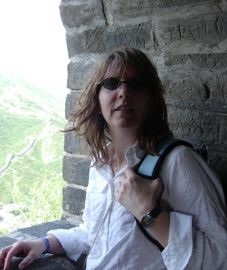
Jen Shelton
Associate Professor, Department of English, TTU
November 8th
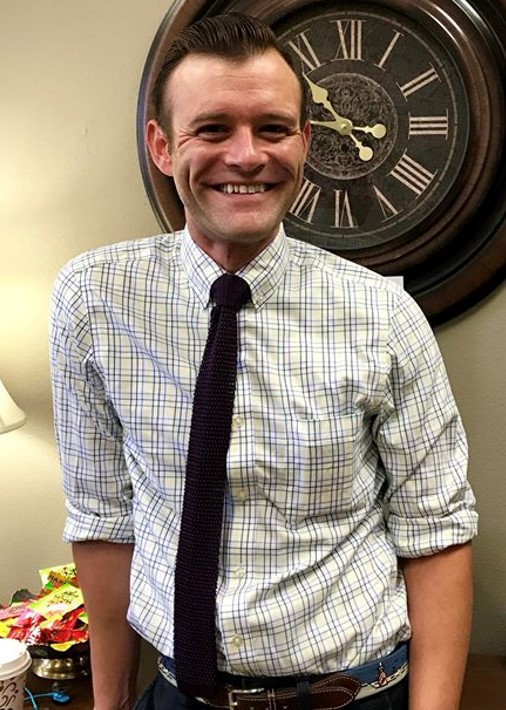
Richard Lutjens
Assistant Professor, Department of History, TTU
November 14th
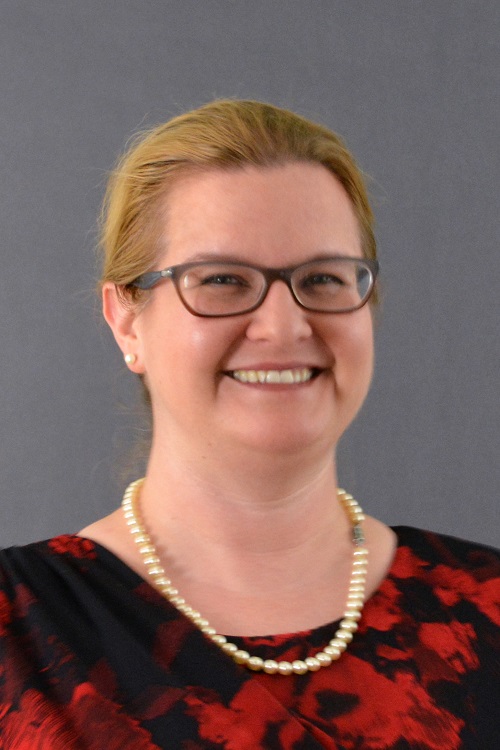
Allison Whitney
Associate Professor, Department of English, TTU
November 15th
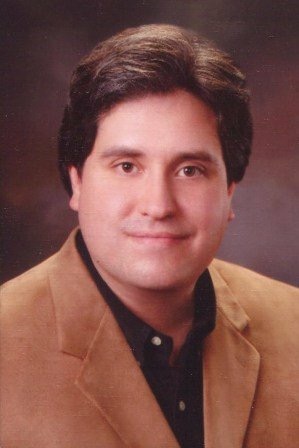
Dr. Michael Fredrick Rollin
Instructor, Department of History at
Texas Tech University, Fredericksburg/Highland Lakes
November 20th
November 27, 2018
Featuring Bruce Gilley, Professor of Political Science, Portland State University
In this talk, Professor Gilley will argue that European colonialism in the 19th and 20th centuries had an overwhelmingly positive impact on colonial areas, whether located in India, Indonesia, Nigeria, or Belize. He will examine the empirical evidence and then seek to explain why colonialism fell out of favor and so rapidly disappeared in the 20th century. This will be followed by a discussion of post-colonial trajectories and the development of a new "neo-colonial" phenomenon, countries with weak administrative capabilities contracting with foreign governments to provide basic services, sometimes in specially cordoned zones.
Dr. Bruce Gilley's research centers on comparative and international politics and public policy. His work covers issues as diverse as democracy, climate change, political legitimacy, and international conflict. He is a specialist on the politics of China and Asia.
The Institute for the Study of Western Civilization
-
Address
Mailing Address: Box 42019 - The Institute for the Study of Western Civilization, Lubbock, TX 79409-2019 -
Phone
806.834.8289 -
Email
steve.balch@ttu.edu

